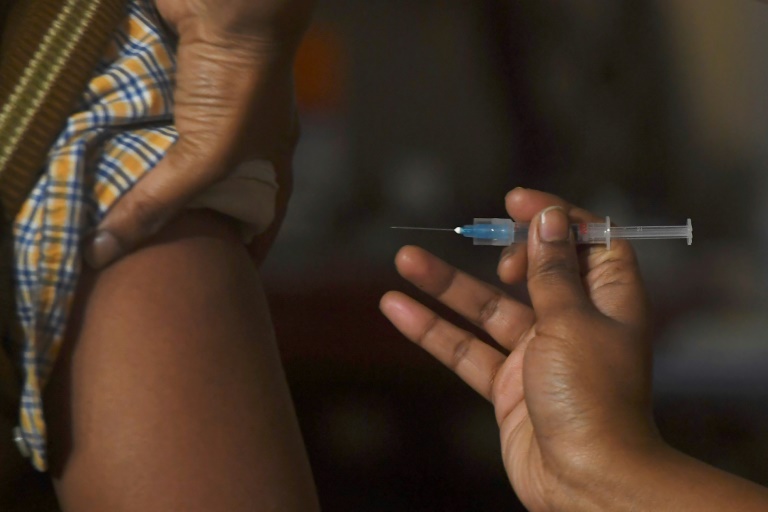India approves vaccines as nations fight virus resurgence
India has been holding holding nationwide drills to prepare for one of the world’s biggest inoculation programmes, which is expected to kick off in the coming weeks. ©AFP Dibyangshu SARKAR
New Delhi (AFP) – India on Sunday approved emergency use of two Covid-19 vaccines to kick off one of the world’s biggest inoculation drives, while the European Union offered to help drug companies expand production to ease distribution bottlenecks.
India, the second-worst affected country, has authorised use of shots developed by AstraZeneca and Oxford University and by local pharmaceutical firm Bharat Biotech, the country’s drug regulator said.
The Serum Institute of India, the world’s biggest manufacturer of vaccines, has said it is making between 50 and 60 million doses a month of the AstraZeneca/Oxford vaccine, which is cheaper than the Pfizer-BioNTech jab and easier to store and transport.
India has set an ambitious target of inoculating 300 million of its 1.3 billion people by mid-2021.
Countries around the globe are hoping that the roll-out of vaccines will bring under control a pandemic which has infected 84.6 million people and killed more than 1.8 million since it first emerged in China just over a year ago.
But there is a worldwide shortage of vaccine production capacity, the EU’s top health official said on Saturday, offering help to drug firms amid concerns over the speed of vaccinations across Europe.
“The situation will improve step by step,” as vaccines roll out, health commissioner Stella Kyriakides told German news agency DPA.
With vaccine production and mass inoculation programmes likely to take months, countries have tightened restrictions to fight a virus resurgence as experts predict a sharp rise in cases after weeks of holiday gatherings.
From local curfews to alcohol bans and complete lockdowns, governments are trying to tackle a surge in infections.
In Bangkok, the city’s nightlife shut down following a ban on bars, nightclubs and restaurant alcohol sales, among a raft of restrictions aimed at curbing Thailand’s rising virus toll after an outbreak at a seafood market last month.
Public schools in the Thai capital are also set to close for two weeks.
In Tokyo, the city’s governor asked the Japanese government to declare a new state of emergency as the country battles a third wave, with record numbers of new cases.
And South Korea extended its anti-virus curbs until January 17 in the greater Seoul area, including a ban on gatherings of more than four people, which will be widened to cover the whole country.
– Vaccine race –
The soaring number of infections means the race to vaccinate is likely to dominate the coming year.
India has held nationwide drills to prepare for one of the world’s biggest inoculation programmes, which is expected to kick off in the coming weeks.
In the United States, the vaccine roll-out has been beset by logistical issues, while the world’s worst-hit country has passed 20 million cases and 350,000 deaths.
The US has seen a surge in infections in recent months and on Saturday saw its highest number yet recorded in one day, with more than 277,000.
Veteran talk show host Larry King became the country’s latest high profile case as he was hospitalised in Los Angeles, US media reported.
In Russia, health minister Mikhail Murashko said more than 800,000 people had received the domestically produced Sputnik V vaccine and that 1.5 million doses had been distributed throughout the country of around 147 million.
The Kremlin has held back on imposing nationwide virus restrictions, instead placing its hopes on the mass vaccination drive to end the pandemic and save its struggling economy.
The French government has lengthened an overnight curfew by two hours in parts of the country to help combat the virus, with the shutdown now starting at 6:00 pm, mainly in the east. Paris has, for now, been spared the additional restriction.
– ‘We had to party’ –
The new French restrictions came as police booked more than 1,200 revellers Saturday for taking part in an illegal rave in the country’s northwest.
Around 800 of them were booked for flouting anti-virus measures, and the regional health authority in Brittany noted a “high risk of the spread of Covid-19” at the event.
“We knew what we were risking… we had to party, for a year everything has been stuck,” said a 20-year-old waitress.
Spanish police broke up another gathering near Barcelona on Saturday, where 300 people had been partying for more than 40 hours.
Footballers were also among those caught breaking the rules, with Tottenham’s Erik Lamela, Sergio Reguilon and Giovani Lo Celso to be disciplined after a picture emerged of them attending a large party.
burs-mtp/oho
Disclaimer: Validity of the above story is for 7 Days from original date of publishing. Source: AFP.


